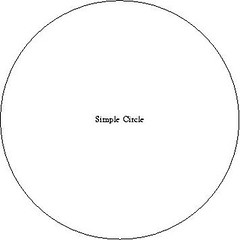
The figure above shows a simple circle. Mathematically a circle us made up of infinite straight lines. So now can you see infinity?
Now what would happen if we started counting numbers on the circle instead of straight line. How many points do you think a semicircle has? A quarter of a circle?
I am thankful, I can see infinity, even if not in all the detail.
NOTE: This is ofcourse not true on the computer, we have a limited set of pixels.
5 comments:
Ya okay,
Well that borders on what I call absurd philosophy. Although I enjoy the principle of the notion intended, I have to try and anchor my own self to reality and realize that "the probabilistic nature of quantum mechanics predictions cannot be explained in terms of some other deterministic theory, and do not simply reflect our limited knowledge. Quantum mechanics provides probabilistic results because the physical universe is itself probabilistic rather than deterministic." The key here is the appreciate what is meant by 'probabilistic results', and its contrast with the notion of a 'deterministic' universe.
However, if it really is infinity that one want so gaze upon, then we only need to look at God Himself. As the only infinte being in the entire universe then it stands to reason that all that is infinite is in God Himself. So the problem for us then is, how can we see God? Science is a great way to discover the characteristics of God, but as complex beings that are made up of many constituent parts (body, mind and spirit), there is so much more to seeing God than just science alone.
Just a quick note. After re-reading the comment I realized that the first sentence could be taken as an offencive statement. So to clarify, it was a statement that was made in humourous jest and nothing more. ;-)
Afterall, I really enjoy absurd philosophy. Most of the famous philosophers engaged in absurd philosophy. It is the idea that by bring in notions that really break conventional thoughts on accepted views, it opens the door for absurd statements to be made liberally.
Just a quick note. After re-reading the comment I realized that the first sentence could be taken as an offencive statement. So to clarify, it was a statement that was made in humourous jest and nothing more. ;-)
Afterall, I really enjoy absurd philosophy. Most of the famous philosophers engaged in absurd philosophy. It is the idea that by bring in notions that really break conventional thoughts on accepted views, it opens the door for absurd statements to be made liberally.
Oops, double post!
Point well taken. I do not find anything offensive at all. I enjoy your comments. Somebody else I know was thinking along the same lines as you.
Thanks for your comments.
Post a Comment